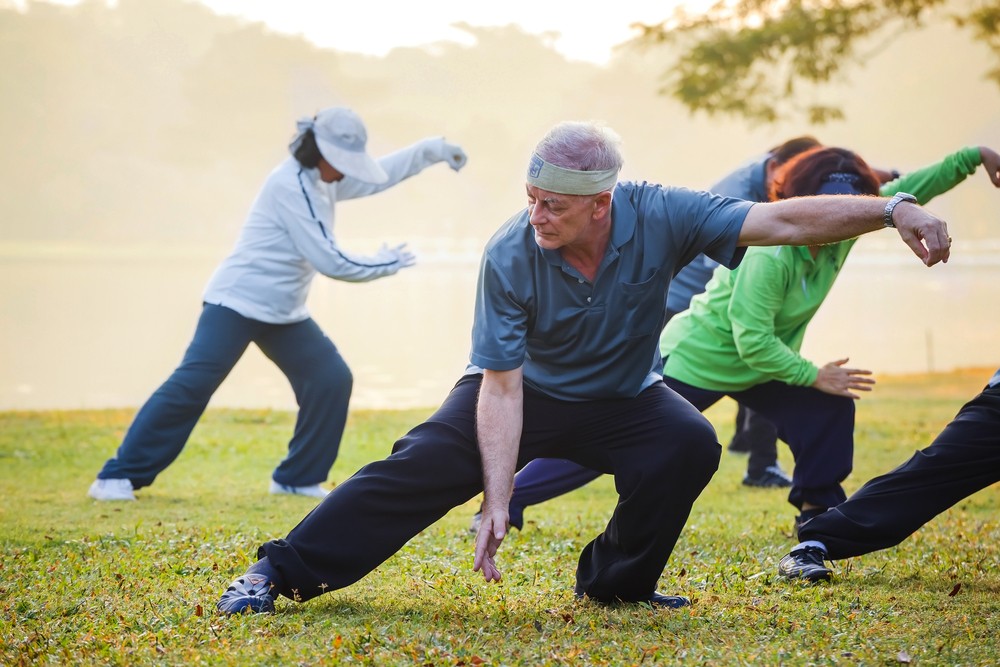The ancient Chinese martial art tai chi (Taiji) is a mind-body practice that nowadays is used to prevent and treat many health problems. Its combination of slow-motion, low-impact, focused body movements and specific deep breathing has led to it being referred to as “moving meditation”, “the longevity exercise” and “medication in motion”.
Tai Chi can be practiced by anyone, even if you are out of shape, in poor health or recovering from surgery (with a patient-specific modified approach). It requires no special equipment or clothing and can be practiced almost anywhere at any time, alone or in a group.
During a Tai Chi session, your body is in constant motion as you move from one position to the next without stopping. During the movements, you breathe deeply and naturally in special breathing patterns and focus on the sensations in your body, thereby calming your mind, relaxing your body, and re-establishing your mind-body connection.
The gentle motions are never forced, your muscles aren’t tensed but remain relaxed, your joints aren’t bent or fully extended, and it doesn’t stretch your connective tissues.)
The main techniques present in tai chi are:
- Cardio-respiratory exercises that require deep and rhythmic breathing and integrate into body motions and muscle movement to harmonize the body’s balance and mental concentration
- Postural and physical exercises to guarantee the healthiest spine position and optimal biomechanics to allow the application of force without tension – “effortless force” is one of the principles of tai chi.
- Guided visualization using the names of tai chi positions such as “white crane spreads its wings”, “tree position” or “needle at the bottom of the see” etc.
- Specific sequences of movements for specific purposes: a certain set of movements are practiced for well-being, while another may be focused on improved martial arts skills
These are just some of the numerous benefits that have been linked to the regular practice of tai chi:
- Increased flexibility, muscle strength and stamina, especially in the core, arms and legs;
- Improved balance, coordination and confidence of movement thereby reducing the chance of falls and stumbles;
- Boosted immunity levels: researchers believe that tai chi boosts the immune system due to its influence on the parasympathetic nervous system (the part of the involuntary nervous system that serves to slow the heart rate, increase intestinal and glandular activity, and relax the sphincter muscles);
- Faster recovery after injury: tai chi movements work to optimize body mechanics (the ways we move as you go about your daily life, such as how you hold your body when you sit, stand, lift, carry, bend, and sleep);
- Better quality of sleep: tai chi’s calming effect on the body, mind and emotions promotes restful sleep;
- Higher levels of concentration, focus and improved memory: concentrating on the body’s motion and breathing deeply improves the connection between your mind and body and creates a state of focus and clarity;
- Reduced stress levels: tai chi “calms the heart” and reduces the “fight-or-flight” response to stress;
- Increased productivity due to improved concentration and focus as well as better sleep, part of tai chi’s overall reconditioning effect on your being;
- Pain relief: according to research published in the New England Journal of Medicine tai chi can reduce pain related to conditions such as arthritis, by improving the biomechanics of the articulation;
- Reduction of symptoms of chronic psychosomatic disorders (diseases which involves both mind and body – some physical diseases are thought to be made worse by mental factors such as stress and anxiety) like high blood pressure, digestive disorders, fibromyalgia, heart disease, tension headaches and many others; and
- Development of practical fight application skills: tai chi was originally developed as a highly effective martial art used to condition invincible warriors.
Prior to starting tai chi, as with any new exercise program, do to talk to your doctor about whether tai chi is safe for you and discuss your overall health with your tai chi instructor so that he or she knows whether you should avoid certain movements.
When searching for a tai chi instructor, please bear in mind that for the moment there is no standard licensing available. However, each instructor must have completed many years of tai chi practice with their own teacher or at a teaching institution and should hold certificates of qualification. Ask him/her about the training they received, their experience and if they can accommodate your health concerns or fitness level.
These days It is possible to learn tai chi on YouTube or from books, but personal contact with the instructor is highly recommended to ensure that you fully understand tai chi’s principles and build your skills correctly, particularly as they differ from other types of exercise.
Many years of practicing tai chi have created powerful changes in my health, character, and way of life as part of an ongoing process. I am convinced that those of you who choose to practice tai chi will enjoy reaping the benefits of this marvelous instrument of health improvement which can help you lead a healthy, happy, and productive life.

